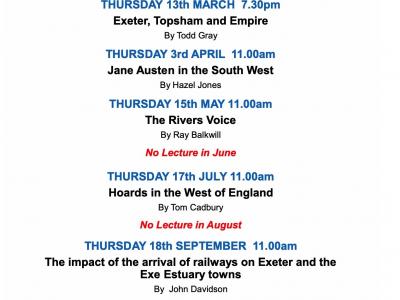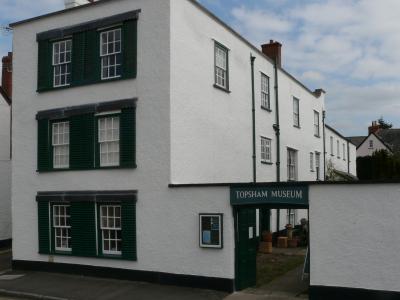The Spanish Armada July 1588 and how Topsham earned this flag - Topsham Museum
Added: 17 July 2020
It was a good old English summer. The wind blew, and the rain poured down.
The Spanish fleet left Lisbon in May, but soon had to seek shelter from storms. Meanwhile, English coastal towns were instructed to send ships to ‘attend on Sir Francis’. By early July, four Topsham ships were in the Estuary and Topsham Quay must have been bustling with workmen and sailors loading supplies.
On 9 July, three of the ships and 140 men set off down the Exe, bound for Plymouth Sound:
Bartholemew 130 tons, 70 men under Captain Nicholas Wright
Rose 110 tons, 50 men under Captain Thomas Sandye
Gift 25 tons, 20 men
On 13 July the fourth ship, the Grace of God, cleared the Estuary to join the fray.
A week later, Sir Francis Drake engaged the Spanish fleet and harried the Armada eastward, with sea battles off Plymouth and Portland. The wind dropped, ships had to be towed into battle by oarsmen, and the fleets drifted eastwards until they were off Calais. In a fierce battle on 28 July, Spain lost 600 men and 800 were wounded. Two days later, as the English were closing in for the kill, a squall set in and soon became a gale. Both fleets were blown northwards and by the time they were off Newcastle-upon-Tyne, were forced to seek shelter. Many Spanish ships were wrecked and the rest struggled to find their way home round the far northern isles of Scotland and the west coast of Ireland.
The Exe contingent probably left the fleet near Dunkirk on 30 July, to sail for home. But that was not quite the end of the adventure for sailors on the Exe. On 29 August, a Spanish ship was brought into the harbour at Cockington, and five of the chief prisoners were committed to Exeter gaol. A Cockington man, George Carey, reported that the ‘crew were in a very poor way and must be relieved otherwise they would perish from want . . . their fish savours so it cannot be eaten and their bread full of worms.’
Latest news
-
Museum Opens for New Season!
Dawlish Museum
-
AGM 2025
Dawlish Museum
-

The David Clement Memorial Lecture: William S Lindsay, shipowner, politician and envoy
Topsham Museum
-

Secret Gardens Programmes on Sale now!
Topsham Museum
-

The Box wins second Muddy Stilettos award
The Box, Plymouth
-

Whiteway's Cyder in the 1920s
Whimple Heritage Centre
-
.jpg&w=400&h=300&zc=1)
Groundbreaking art exhibition arrives at The Box
The Box, Plymouth
-

Open call for artists to work on Changing Stories: Connecting and Collecting with Exeter’s Communities
Royal Albert Memorial Museum and Art Gallery
-
Summer season opening
Totnes Museum
-

Save the Date! Secret Gardens of Topsham, Sunday 8 June 2025
Topsham Museum
-

Full Ahead Lecture Season 2025: Jane Austen and her South West Connections
Topsham Museum
-

Art Exhibition: David Robinson, artist, accountant and sailor
Topsham Museum
-

Full Ahead Lecture Season 2025
Topsham Museum
-

Repairs to the Museum
Topsham Museum
-

New Artist Opportunity from Exeter’s Royal Albert Memorial Museum and Art Gallery
Royal Albert Memorial Museum and Art Gallery




.jpg&q=100&w=600)





